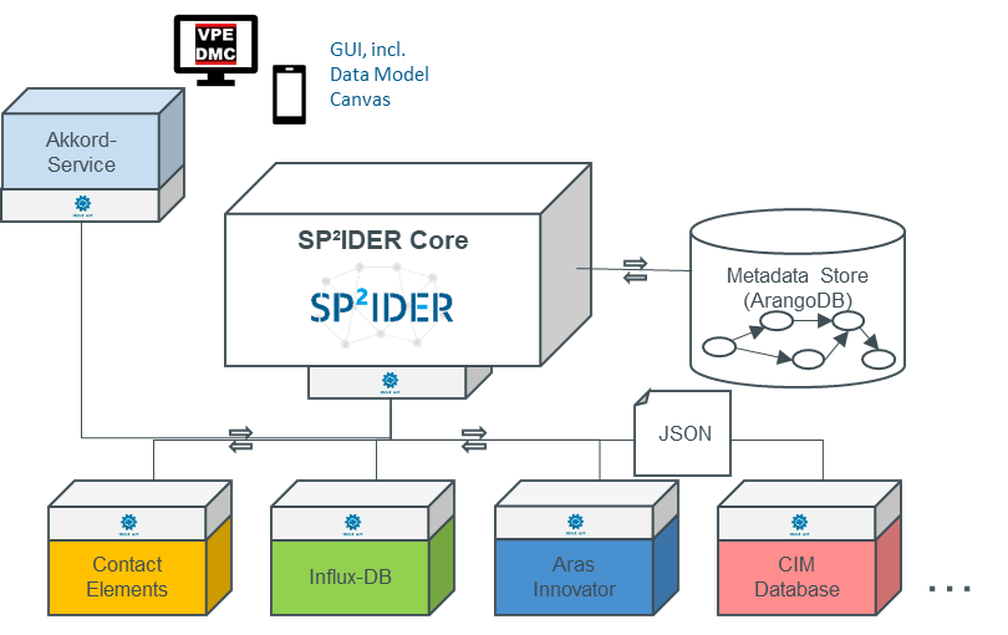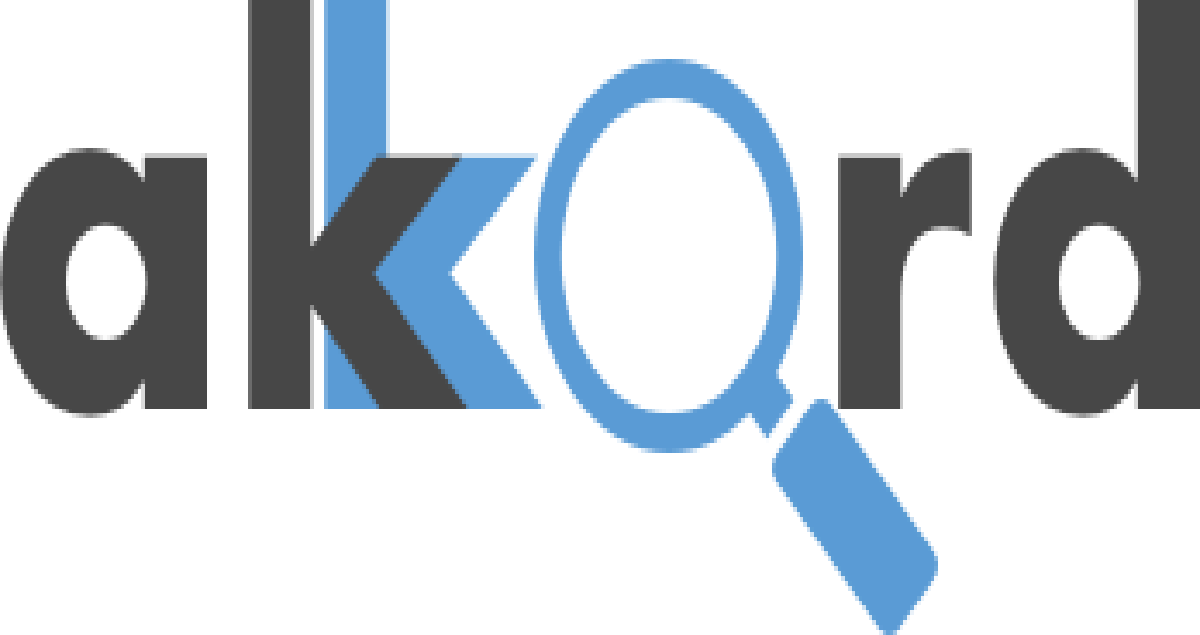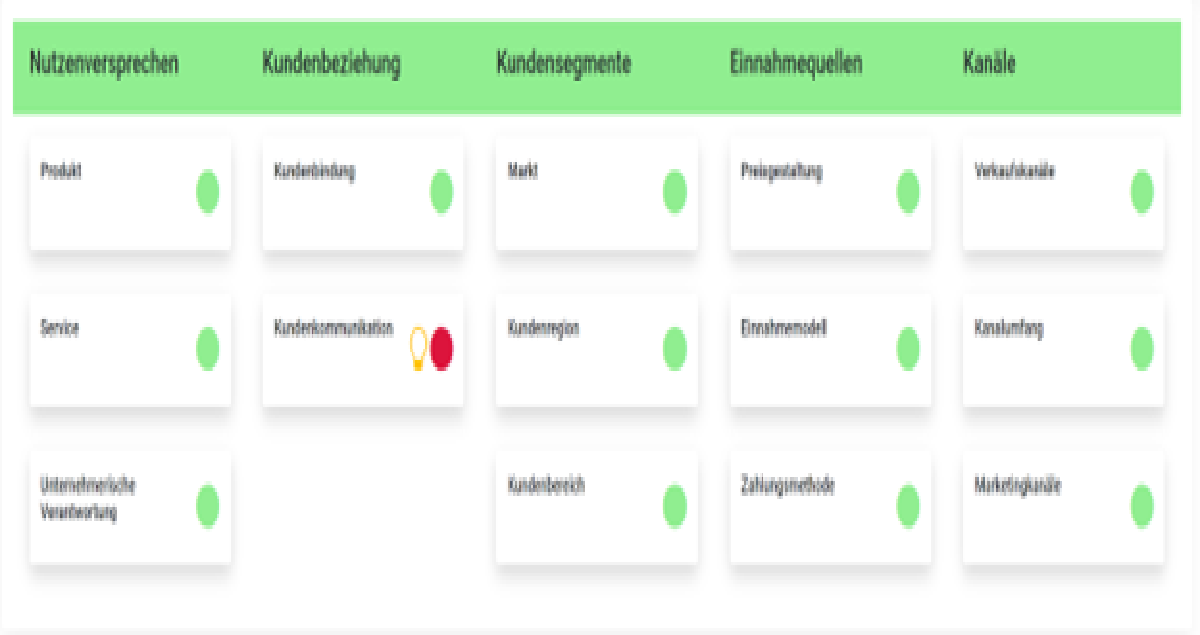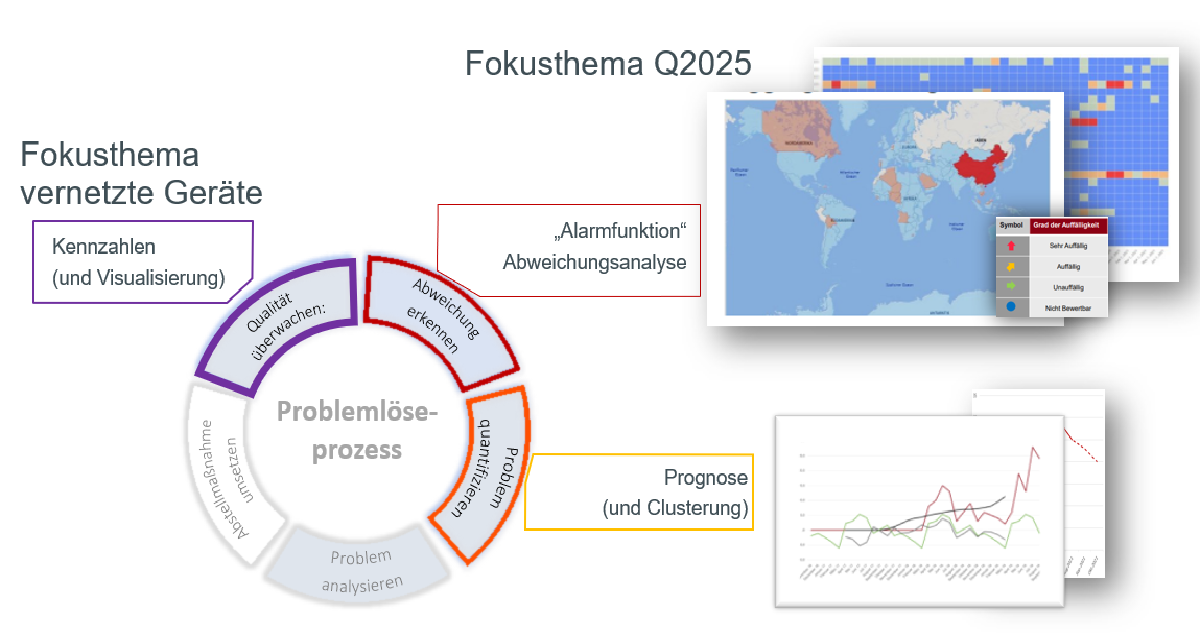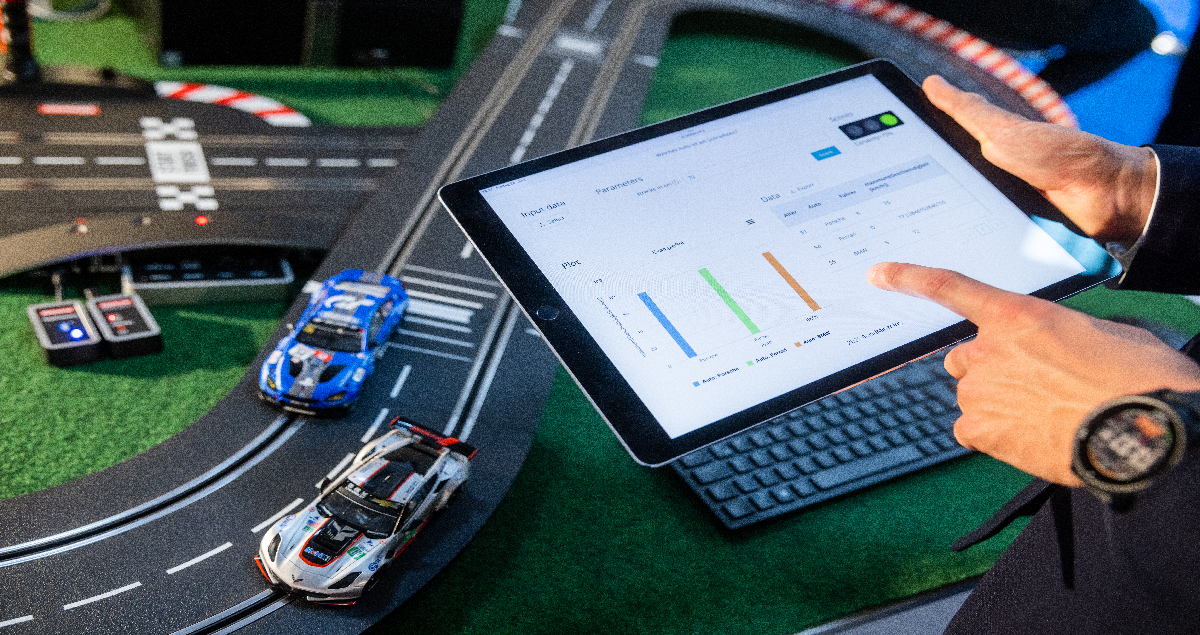First Work report from the research area “Competences and recommendations for action“
In this research area, a transfer to concrete and measurable competence definitions and areas is focussed on the basis of the identified requirement areas and necessary competences of the employees and corresponding measuring instruments are developed. From this, appropriate, situational technology-based learning modules for industrial data analysis will be realised. The measuring instruments and the learning modules will be implemented as a learning management system in an online-supported work & learn platform. The infrastructure makes it possible to record and promote the necessary competences of the employees and to transfer them into practical concepts and recommendations for action. The practical implementation takes place in close exchange with our partners in the AKKORD project as well as through feedback from the companies.
General introduction to the performance area
The service area “Competences and recommendations for action” is one of four main topics in the AKKORD research project. A summary overview of the planned reference toolkit and the four service areas is provided in this news article.
Further information can be found in the kickoff publication of the research project. The following illustration additionally locates the above-mentioned service area as part of the overall project.
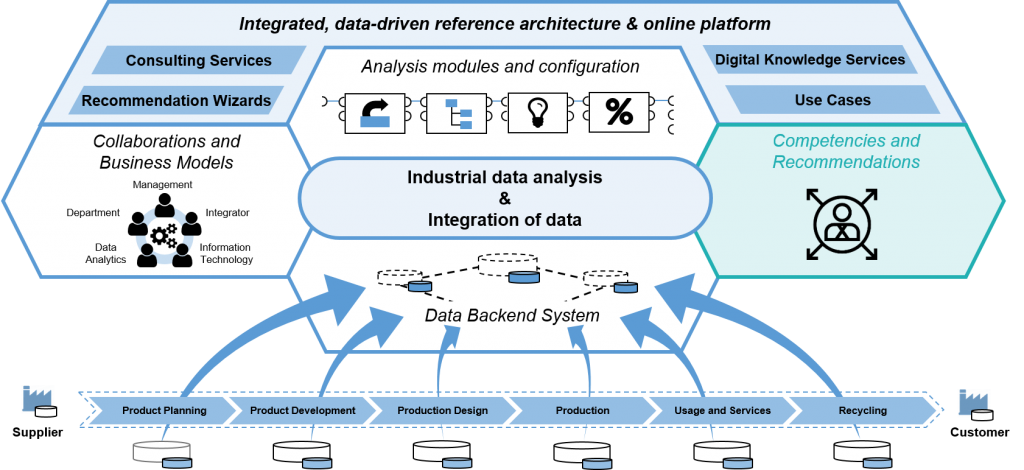
In the service area “Competences and Recommendations for Action”, our development partner Neocosmo and we, the Teaching Unit for Didactics in Technology (FdT) at the TU Kaiserslautern, are working in a leading role on the partial solutions of the reference construction kit for value-creating, competence-oriented collaboration in dynamic value creation networks. Through the preliminary work in identifying needs for action and requirements for competence building, as well as its safeguarding and conceptual design, corresponding recording instruments are being developed and implemented.
The work is supported by our other consortium partners, including Volkswagen, Miele, ERCO, AREND, Mosaiic, Contact, RapidMiner, PDTec, IPS, DFKI and VPE, who contribute in particular with sample data sets from practice and technical assistance. The use case implementations are described in more detail on the AKKORD page.
Procedure for the joint processing of the performance area
The extensive group of consortium partners involved makes the importance and complexity of the implementation clear. For a well-coordinated and yet parallelised processing, the tasks and responsibilities in the consortium are divided according to the partner groups.
The application partners help with the identification of needs, data supply and joint realisation by using their industrial experience. The participating research partners design technology-based instruments, such as performance tests and self-assessment tools for competence diagnostics and development. The development partners drive the technical realisation and development of the corresponding instruments and the transferability to the Work & Learn platform. A common task of all partners is the iterative improvement of the developed contents through testing and the identification of improvement potentials.
The following developments are envisaged so that, especially for small and medium-sized enterprises, a competence assessment, a promotion and a safeguarding in value creation networks can be created in order to generate practical concepts and recommendations for action:
- Through the development of clear competence definitions and areas as well as corresponding technology-based instruments for competence diagnosis for industrial data analysis in value creation networks at different company levels, a competence assessment can take place.
- With the help of the situated and technology-based learning modules, which depict authentic problem-solving scenarios in the field of industrial data analysis, the learning effectiveness of the learning modules or the competence progress can be mapped by the developed instruments.
- Through the development of a knowledge service for industrial data analysis, a company-specific or application partner-specific digital knowledge transfer can be provided.
- By developing learning modules, guides and best practice examples that are available as a general and open knowledge service, these can be used and adapted by other companies.
With the help of these developments, the service area “Competences and recommendations for action” is implemented for the superordinate reference toolkit.
Implementation
Competence diagnostics is the recording of certain competences of an individual through the use of tests. It also includes a classification into certain categories. The aim of the diagnosis is both a comparability of the learning success and a support of the learning process in order to be able to offer the users an optimal learning offer for them. One of the best-known tests for the comparability of competencies is probably the “Programme for International Student Assessment”, or PISA, which is used to determine the learning level of students in most OECD member states, as well as an ever-increasing number of partner countries.
In the AKKORD project, too, competence assessment instruments were developed which represent the planned implementations as individual building blocks. The following graphic shows the current processing status of the competence development planned in the AKKORD project and highlights the building blocks of the service area “Competences and Recommendations for Action” in colour.
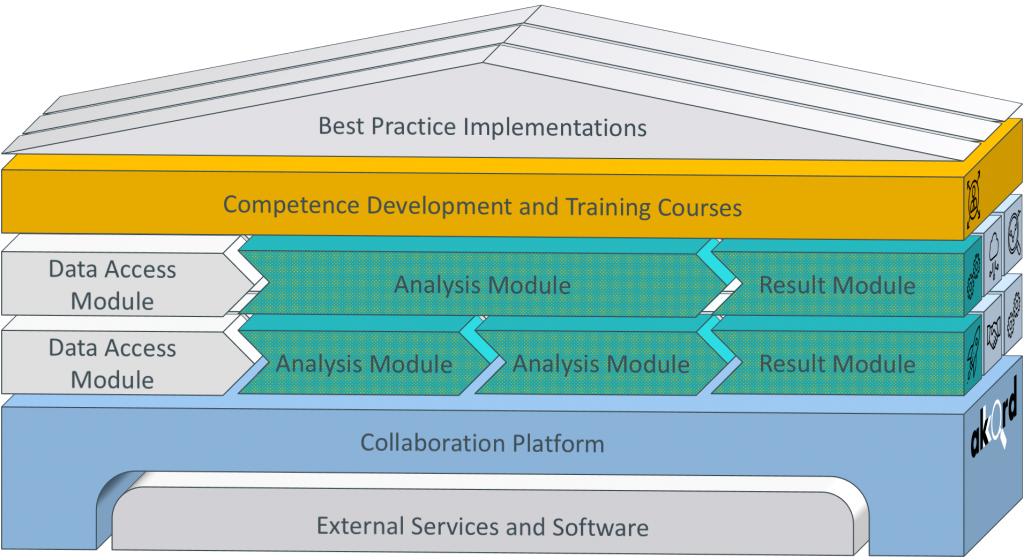
On the top floor of the presentation, located between the best practices and the access modules, analysis modules and presentation modules, is the competence development.
The difficulty of competence development is that it is first necessary to record the actual competence. Since the data science competences required for a professional role can vary greatly across sectors, a multi-dimensional perspective is chosen as the approach to recording and increasing the necessary user competence. In order to be able to carry out an effective competence measurement in the context of data science, it is therefore first important to record the current level of experience of individual employees.
Through an extensive literature review, it was already possible to identify initial competence roles and requirements in relation to industrial data science. However, the results obtained there serve to provide a rough overview of certain competence roles in companies. For this purpose, the tasks of various professions were researched and corresponding competence levels were assigned to them. However, only the requirements of typical data science roles, such as data scientist, could be determined, and here too there was contradictory information in the sources. For the broad mass of potential users, however, there is a lack of corresponding research results on the fine-grained recording of data science competences of the non-typical data science roles. Thus, initially, it was not possible to identify an exact competence assessment of the future users by way of pure literature research.
Practical components of competence assessment
In addition to researching the literature, a questionnaire was developed in the form of self-reporting. The questionnaire with the following research question: “Where can competence profiles be classified in data science applications in companies” went through many iterative steps in its creation. First, a mock-up of the questionnaire was set up. Among other things, the survey instrument was continuously optimised with the help of project partners.
Due to the large number of companies contacted (number of companies surveyed), the software Umbuzoo was used as an online survey creation tool. Approximately 1500 companies from the relevant sectors (automotive, chemical, pharmaceutical, banking, insurance, etc.) were contacted and invited to participate in the questionnaire. The figure below shows an excerpt of the questionnaire.
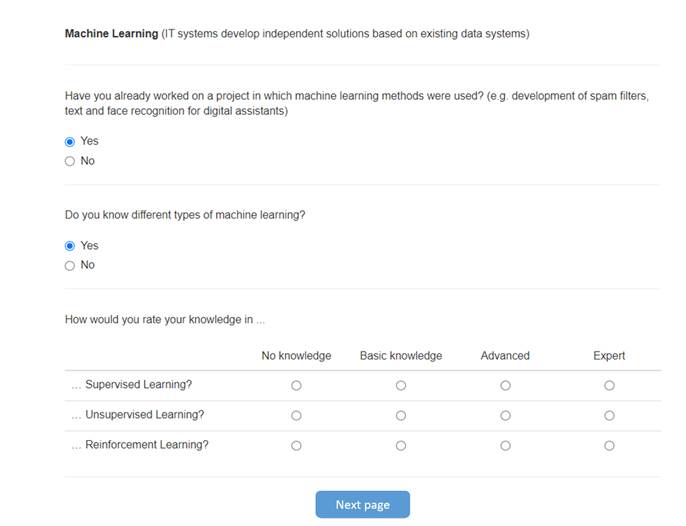
Summary and outlook on the further goals of the project
In order to be able to record the different competence profiles of employees in SMEs, a literature research was first carried out as an introduction, which showed the first competence roles and requirements – partly also with contrary statements, in the context of data science in the classic data science activities. In order to record user-specific roles and requirements – especially with regard to a cross-company learning platform offer – an online questionnaire with different sections was developed to better record the needs of our future platform users and to be able to develop suitable learning modules from this. On the one hand, we are currently working on optimising the questionnaire response rate, as it is precisely this form of survey that is proving challenging for the companies. On the other hand, we are already actively working on a basic course that is oriented towards the process steps of KDD (Knowledge of Data Discovery).
Further information and interim results are continuously published on the AKKORD website and in the news articles.
Author und Contact Person:

